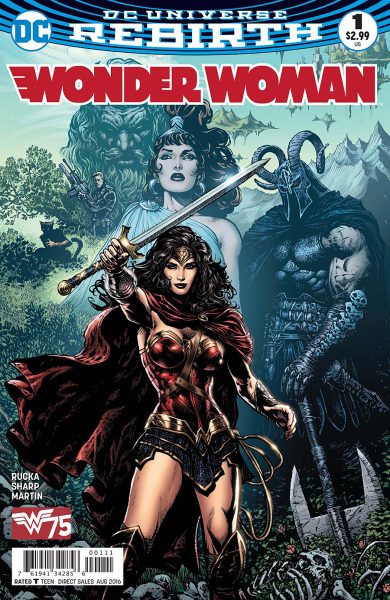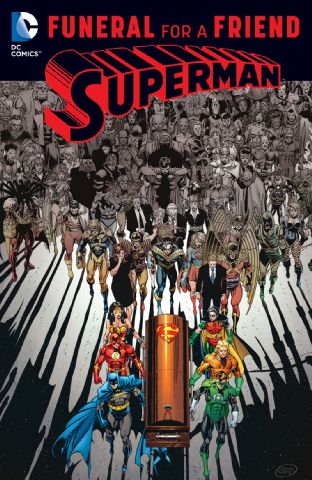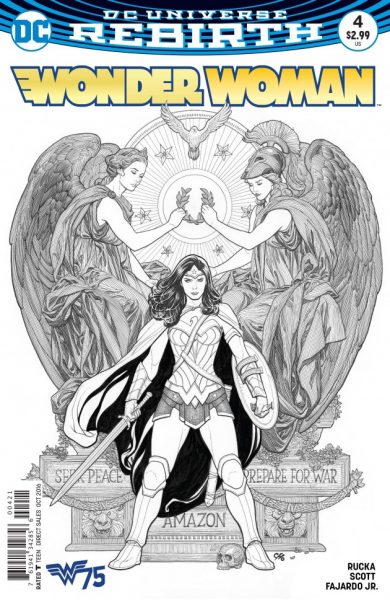Comic Characters Like Wonder Woman Should Be Able to Evolve
Comic books are no stranger to controversy. Writer Greg Rucka made comments in an interview that stirred a new one this week. Rucka, the current writer of
Wonder Woman who has a number of runs with the character, indicated in an interview that Wonder Woman has
romantic/sexual interest in women as well as men. For some people, this news was met with a “well, yeah, of course… she grew up on an island of women." Other comic book fans were up in arms because they thought this was a writer changing a long-standing character. While there are some legitimate reasons to say that there have been indications in the comics for some time that Wonder Woman has bi-tendencies, I also think that even if there weren’t, we have to allow comic characters room to evolve.

Wonder Woman, created by William Moulton Marston, was one of the original characters (along with Superman and Batman) that caught public attention from DC. She first appeared in
All Star Comics #8 in 1941. So this year the character is 75 years old. It is very difficult to keep a character lively and interesting for 75 years if you do not allow change and growth. There have been some periods of change for Wonder Woman, such as when she didn’t have powers in the early 1970s. Writers have taken her in different directions. She has even had different origins. In some versions, she was born from a clay figure that has been magically brought to life by the gods. In others, she is the birth daughter of the gods Hippolyta and Zeus. So there has been some variation in the character already.
However, comic characters have to change over time or they risk becoming static, predictable and boring. There have been periods of that with Wonder Woman since there are only so many tales to tell about a warrior princess before it starts to feel familiar. There are many classic characters who have had major changes to them. Superman died and was reborn, Batman broke his back and had a son, Spider-Man was not Peter Parker for a time, Steve Rogers gave up the Captain America mantle (and is maybe a Hydra agent?), and Thor has changed numerous times. Some of these changes worked out better than others. However, the point is that shake-ups need to occasionally happen to keep the characters feeling fresh.

Some fans become very devoted to certain versions of comic characters to the point of being protective of that version. That is understandable. When a creator comes onto a title and has a radically different take that doesn’t seem consistent with the fundamental elements of that character, fans are entitled to feel wary. They can complain to the publisher and on the Internet. They can even stop buying the comic. The past comics will still always exist, though. So the “true version” of the character (for that fan) will always be there. The nature of serial comics, created by a succession of people, means there will always be differences. Fans should also try to be patient, too. Some major deviations in characters that are now considered classic – such as the death of Superman – were considered controversial at the time.
Very few creators (really, probably none) of Golden Age comics expected their creations to last this long. The problem with comic characters that become this popular and iconic is that there becomes a default version of the character that cannot be fundamentally changed, at least not without a great deal of consternation. Fans want to see Batman as Bruce Wayne, not Dick Grayson. Marvel Comics have revamped their heroes in the past few years. Although it hasn’t been liked by all fans, I give the publisher credit for trying to shake things up. It is likely that after giving up his armor to Riri Williams, Tony Stark will one day wear it again. Still, that doesn’t discount that it is worth having the story with a different version of the character.

Comic characters in 2016 should not be the same as they were in 1986. It would very boring if there were never new major characters and the existing major characters never changed. Similarly, Wonder Woman in 2016 shouldn’t necessarily be exactly the same as she was in 1986 or 1941. Readers may not always like the changes, but we have to allow for them and be open to them. The alternative is story after story without consequences and surprise. Without the opportunity for change, comics would quickly become boring and likely face big drops in readership.
 Wonder Woman, created by William Moulton Marston, was one of the original characters (along with Superman and Batman) that caught public attention from DC. She first appeared in All Star Comics #8 in 1941. So this year the character is 75 years old. It is very difficult to keep a character lively and interesting for 75 years if you do not allow change and growth. There have been some periods of change for Wonder Woman, such as when she didn’t have powers in the early 1970s. Writers have taken her in different directions. She has even had different origins. In some versions, she was born from a clay figure that has been magically brought to life by the gods. In others, she is the birth daughter of the gods Hippolyta and Zeus. So there has been some variation in the character already.
However, comic characters have to change over time or they risk becoming static, predictable and boring. There have been periods of that with Wonder Woman since there are only so many tales to tell about a warrior princess before it starts to feel familiar. There are many classic characters who have had major changes to them. Superman died and was reborn, Batman broke his back and had a son, Spider-Man was not Peter Parker for a time, Steve Rogers gave up the Captain America mantle (and is maybe a Hydra agent?), and Thor has changed numerous times. Some of these changes worked out better than others. However, the point is that shake-ups need to occasionally happen to keep the characters feeling fresh.
Wonder Woman, created by William Moulton Marston, was one of the original characters (along with Superman and Batman) that caught public attention from DC. She first appeared in All Star Comics #8 in 1941. So this year the character is 75 years old. It is very difficult to keep a character lively and interesting for 75 years if you do not allow change and growth. There have been some periods of change for Wonder Woman, such as when she didn’t have powers in the early 1970s. Writers have taken her in different directions. She has even had different origins. In some versions, she was born from a clay figure that has been magically brought to life by the gods. In others, she is the birth daughter of the gods Hippolyta and Zeus. So there has been some variation in the character already.
However, comic characters have to change over time or they risk becoming static, predictable and boring. There have been periods of that with Wonder Woman since there are only so many tales to tell about a warrior princess before it starts to feel familiar. There are many classic characters who have had major changes to them. Superman died and was reborn, Batman broke his back and had a son, Spider-Man was not Peter Parker for a time, Steve Rogers gave up the Captain America mantle (and is maybe a Hydra agent?), and Thor has changed numerous times. Some of these changes worked out better than others. However, the point is that shake-ups need to occasionally happen to keep the characters feeling fresh.
 Some fans become very devoted to certain versions of comic characters to the point of being protective of that version. That is understandable. When a creator comes onto a title and has a radically different take that doesn’t seem consistent with the fundamental elements of that character, fans are entitled to feel wary. They can complain to the publisher and on the Internet. They can even stop buying the comic. The past comics will still always exist, though. So the “true version” of the character (for that fan) will always be there. The nature of serial comics, created by a succession of people, means there will always be differences. Fans should also try to be patient, too. Some major deviations in characters that are now considered classic – such as the death of Superman – were considered controversial at the time.
Very few creators (really, probably none) of Golden Age comics expected their creations to last this long. The problem with comic characters that become this popular and iconic is that there becomes a default version of the character that cannot be fundamentally changed, at least not without a great deal of consternation. Fans want to see Batman as Bruce Wayne, not Dick Grayson. Marvel Comics have revamped their heroes in the past few years. Although it hasn’t been liked by all fans, I give the publisher credit for trying to shake things up. It is likely that after giving up his armor to Riri Williams, Tony Stark will one day wear it again. Still, that doesn’t discount that it is worth having the story with a different version of the character.
Some fans become very devoted to certain versions of comic characters to the point of being protective of that version. That is understandable. When a creator comes onto a title and has a radically different take that doesn’t seem consistent with the fundamental elements of that character, fans are entitled to feel wary. They can complain to the publisher and on the Internet. They can even stop buying the comic. The past comics will still always exist, though. So the “true version” of the character (for that fan) will always be there. The nature of serial comics, created by a succession of people, means there will always be differences. Fans should also try to be patient, too. Some major deviations in characters that are now considered classic – such as the death of Superman – were considered controversial at the time.
Very few creators (really, probably none) of Golden Age comics expected their creations to last this long. The problem with comic characters that become this popular and iconic is that there becomes a default version of the character that cannot be fundamentally changed, at least not without a great deal of consternation. Fans want to see Batman as Bruce Wayne, not Dick Grayson. Marvel Comics have revamped their heroes in the past few years. Although it hasn’t been liked by all fans, I give the publisher credit for trying to shake things up. It is likely that after giving up his armor to Riri Williams, Tony Stark will one day wear it again. Still, that doesn’t discount that it is worth having the story with a different version of the character.
 Comic characters in 2016 should not be the same as they were in 1986. It would very boring if there were never new major characters and the existing major characters never changed. Similarly, Wonder Woman in 2016 shouldn’t necessarily be exactly the same as she was in 1986 or 1941. Readers may not always like the changes, but we have to allow for them and be open to them. The alternative is story after story without consequences and surprise. Without the opportunity for change, comics would quickly become boring and likely face big drops in readership.
Comic characters in 2016 should not be the same as they were in 1986. It would very boring if there were never new major characters and the existing major characters never changed. Similarly, Wonder Woman in 2016 shouldn’t necessarily be exactly the same as she was in 1986 or 1941. Readers may not always like the changes, but we have to allow for them and be open to them. The alternative is story after story without consequences and surprise. Without the opportunity for change, comics would quickly become boring and likely face big drops in readership.